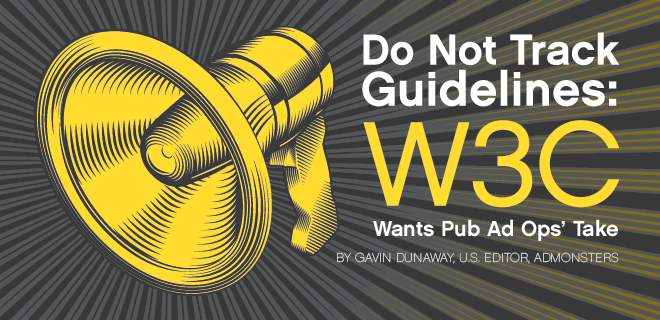
UPDATE: The AdMonsters DNT meetup was a rousing three-hour discussion that poured over into a delightful talk over drinks. Our appreciation goes out to all who attended – including representatives from NYTimes, MTV/Viacom, A&E Networks, Clearspring, Gawker and more – with extra thanks to W3C Tracking Protection Working Group Co-Chair Aleecia McDonald (her presentation inspired great deliberation), Alan Chapell of Chapell & Associates and NBCUniversal for providing an excellent meeting space.
In late February, the White House issued a report on consumer data privacy cleverly subtitled, “A Framework for Protecting Privacy and Promoting Innovation in the Global Digital Economy.” While rather wordy, the subhead accurately acknowledges a difficult balancing act: assuaging online users’ privacy concerns while not immensely hobbling the burgeoning online data economy.
(See NYC DNT meetup details here. The event has limited room and is invite-only – contact the content team if you are interested in attending.)
In conjunction with the White House’s release, the last major web browser holding out on a DNT function surrendered: Google announced a “Do Not Track” mechanism would be available in its Chrome browser. In addition, the White House noted on a fact sheet that the companies behind 90% of behaviorally targeted ads (including Google, Yahoo!, AOL and more) have agreed to comply with a DNT HTTP header.
Within consumer privacy initiatives across the spectrum, the most confusion and controversy (perhaps hysteria?) has circled around browser DNT functionalities – especially the standards around DNT implementation and compliance. The World Wide Web Consortium (commonly known as the W3C) has taken lead on the unenviable task of developing guidance for browsers, publishers, marketers, advertising technology companies and others regarding the definition of online tracking (still up for debate), the implementation and functions of a DNT mechanism, and what DNT compliance entails. Piece of cake, right?
If as a publisher you’re freaking out about what effect DNT may have on your site and revenue operations, it’s understandable. If this guidance gets steered in the wrong direction, the fallout for the online publishing industry could be brutal. So ad op pros, it’s time to form some opinions and get them heard by the people that matter – fortunately for you, those people are dying to hear what you have to say.
On May 3 in New York City, AdMonsters will bring together publisher ad ops professionals and leaders of W3C’s Tracking Protection Working Group to discuss the in-development guidelines. Last week, the W3C issued updated working drafts regarding both the Tracking Preference Expression (DNT) (i.e., the DNT mechanism itself) and Tracking Compliance and Scope (the obligations of a website that receives a DNT message).
The group is seeking publisher feedback on the clarity of these documents, what sections are most imperative to publisher operations and other concerns these companies have around the draft DNT guidelines. W3C is trying to determine which aspects of compliance with tracking preferences will be the most burdensome for publishers across the spectrum and whether there are ways to alleviate difficulties. For example, the group would like to hear from publishers of various sizes regarding section 6 of the DNT document: “Site-Specific Exceptions.”
That document is quite technical and may require operations people to confer with the tech people in charge of implementing HTTP header material. At its most basic, the DNT “specification defines the HTTP request header field DNT for expressing a tracking preference on the Web, a well-known location (URI) for providing a machine-readable tracking status resource that describes a service’s DNT compliance, the HTTP response header field Tk for resources to communicate their compliance or non-compliance with the user’s expressed preference, and JavaScript APIs for determining DNT status and requesting a site-specific exception.”
Both documents offer a fascinating inside look into the development of guidelines that could have a dramatic effect on the digital publishing business. For example, check out section 3.8 of the Compliance document for proposed options for defining tracking and 3.9 regarding “affirmative, informed consent.” The same draft also covers exemptions for operational use of data (section 4.5.1) (include frequency capping, third-party auditing, financial logging and contextual content or ad serving) and exemptions for outsourcing, such as when a third-party performs data collection duties for a first party without using the data for its own purposes (think analytics).
Because not everyone can make the trek to NYC, AdMonsters is also planning to hold a conference call/webcast so ad ops professionals who can’t join on May 3 can share their thoughts. If you are interested in participating, please write to the content team.
Also, to help us define an agenda for both the conference call/webcast and W3C meeting, we ask you to submit your chief concerns and questions to the AdMonsters content team or add to the discussion in this forum thread. All will be taken into consideration when planning the conference call/webcast and in-person meeting.
Don’t blink, Monsters – this is a chance to get your opinion heard on a major issue, one that may be a defining characteristic of the Internet experience going forward. It’s also a situation that’s bound to have a major impact on your business. Please read the draft guidelines carefully (DNT mechanism and Compliance), add your thoughts in the forum and/or reach out to contentadmonsters.com.
 |
Get the latest on all things premium at OPS London, which will bring EU digital advertising leaders and ops professionals together to discuss and develop best practices for operational excellence.Register today for OPS London, which will be held May 15, 2012. |